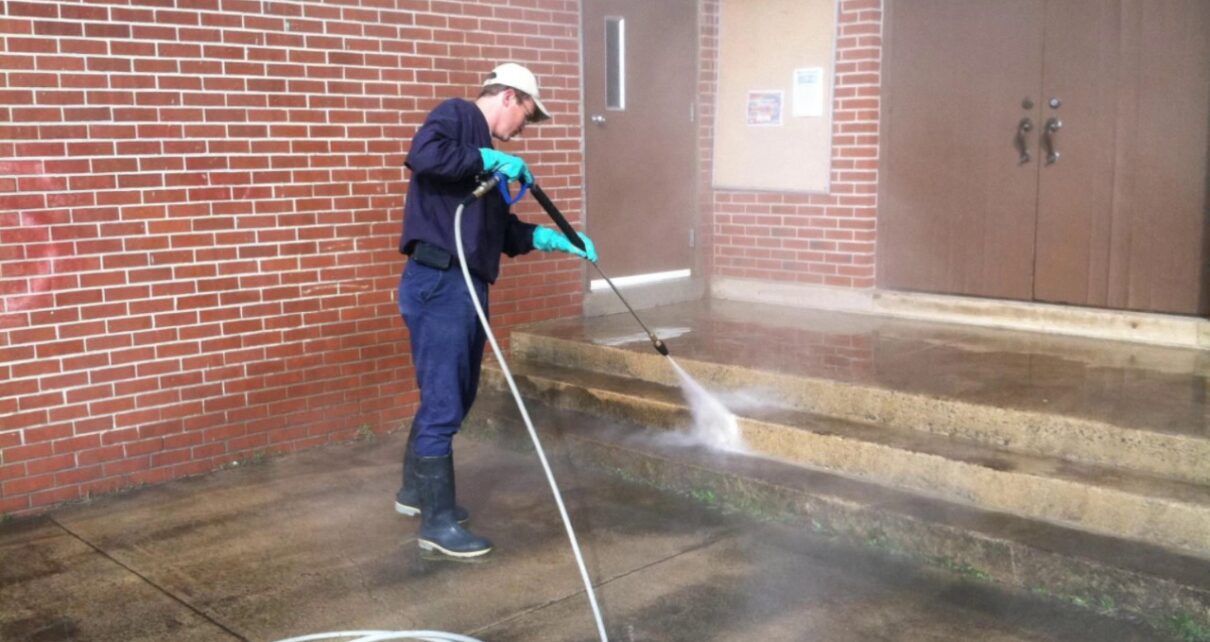Outdoor surfaces are constantly exposed to dirt, grime, mould, moss, and pollution. Over time, these elements don’t just affect appearance—they can also damage the surfaces themselves. Fortunately, pressure washing offers a powerful solution to restore your property’s exterior quickly and effectively.
Whether you’re a homeowner, landlord, or business owner in the UK, pressure washing is one of the most cost-effective and efficient ways to clean various outdoor surfaces. But which surfaces benefit most from this service?
Let’s take a closer look at where pressure washing truly shines—and why it’s a must for proper property maintenance.
What Is Pressure Washing?
Pressure washing, also known as power washing, is the use of high-pressure water to remove dirt, moss, mould, algae, stains, and other debris from surfaces. Depending on the surface material and condition, professionals may use either cold water or hot water pressure washers, sometimes with added detergents for more stubborn grime.
In the UK, where moisture and moss are common issues, pressure washing is particularly valuable for maintaining safe and attractive external spaces.
Top Surfaces That Benefit from Pressure Washing
1. Driveways
One of the most common applications of pressure washing is driveway cleaning. Driveways endure heavy use and are magnets for oil stains, tyre marks, algae, and dirt. Whether your driveway is made of concrete, tarmac, or block paving, pressure washing restores its appearance and prevents moss build-up that can lead to slippery, unsafe surfaces.
2. Patios
British gardens are famous for their patios—but damp weather often causes them to develop green slime, algae, and discolouration. Patio pressure washing blasts away this mess, leaving your patio looking fresh and ready for entertaining. It’s especially helpful in spring when many UK homeowners begin prepping their outdoor spaces for the warmer months.
3. Decking
Wooden decks can be particularly vulnerable to moisture damage, mildew, and grime build-up. Deck cleaning with the right pressure settings ensures that dirt is removed without damaging the wood grain. Professionals know how to adjust pressure and use soft washing techniques when needed to avoid splintering or surface damage.
4. Exterior Walls and Rendering
Over time, external walls and render can become stained from pollution, algae, or general weathering—especially in urban or coastal areas of the UK. Render washing and brick pressure washing can restore walls to their original appearance, improving kerb appeal and protecting the building’s surface from long-term wear.
5. Paths and Walkways
Pavements and garden paths are prone to moss and algae, which become dangerous when wet. Pressure washing removes these slippery hazards while revitalising the look of stone, brick, or concrete surfaces. It’s not just cosmetic—it’s also about moss and algae removal for better safety.
6. Fences and Gates
Over time, wooden and metal fences collect dirt, cobwebs, and rust. Pressure washing brings these structures back to life, especially before painting or treatment. For wooden fences, a lighter pressure is used to preserve the material while still achieving a deep clean.
7. Garages and Sheds
Outbuildings like garages and sheds are often overlooked during routine cleaning. Pressure washing these areas helps prevent mould growth, especially on metal or timber structures, and makes your entire property look more polished and well-kept.
Why Hire a Professional Pressure Washing Service?
While pressure washing machines are available for hire, professional services provide several advantages:
- Correct pressure settings for each surface
- Use of eco-friendly detergents and solutions
- Expertise in external surface cleaning without damage
- Fast, efficient results
- Full clean-up and waste disposal
- Compliance with UK safety and water use regulations
In short, professionals know how to clean thoroughly while protecting your property’s materials and surrounding areas.
When Is the Best Time for Pressure Washing in the UK?
The best time for pressure washing in the UK is typically in spring and early summer. These seasons offer moderate temperatures and drier days—ideal conditions for cleaning and drying.
However, pressure washing can be done year-round depending on the surface and local conditions. Many UK homeowners opt for autumn cleans to remove fallen leaves and dirt before winter.
Benefits Beyond Appearance
Pressure washing is not just about aesthetics. Regular pressure washing:
- Extends the life of outdoor surfaces
- Improves property value
- Reduces the risk of slips and falls
- Prevents costly repairs by maintaining surfaces
- Enhances hygiene by removing bacteria, mould, and allergens
Conclusion
From patios and driveways to fencing and render, pressure washing offers an effective way to maintain your property’s appearance, safety, and structural integrity. With the UK’s damp and unpredictable weather, outdoor surfaces need regular attention—and pressure washing is the perfect solution.
Whether you’re preparing for a property sale, cleaning up after winter, or simply want a garden you can enjoy, investing in professional pressure washing services ensures every surface is cleaned correctly and safely.
FAQs
Is pressure washing safe for all surfaces?
No. Some surfaces like painted wood or delicate render require low pressure or soft washing. Professionals adjust techniques to suit each surface.
How often should I pressure wash my driveway or patio?
Most surfaces benefit from an annual clean. High-traffic areas may need it more often depending on grime, weather, and moss build-up.
Does pressure washing use a lot of water?
While it uses water under high pressure, it’s generally more efficient than scrubbing with a hose and achieves better results faster.
Can I do pressure washing myself?
DIY is possible, but incorrect pressure or technique can cause damage. Professionals offer better results and peace of mind.
Do pressure washing services include moss and algae removal?
Yes. Most UK pressure washing providers also offer moss and algae removal to improve safety and extend the life of surfaces.




